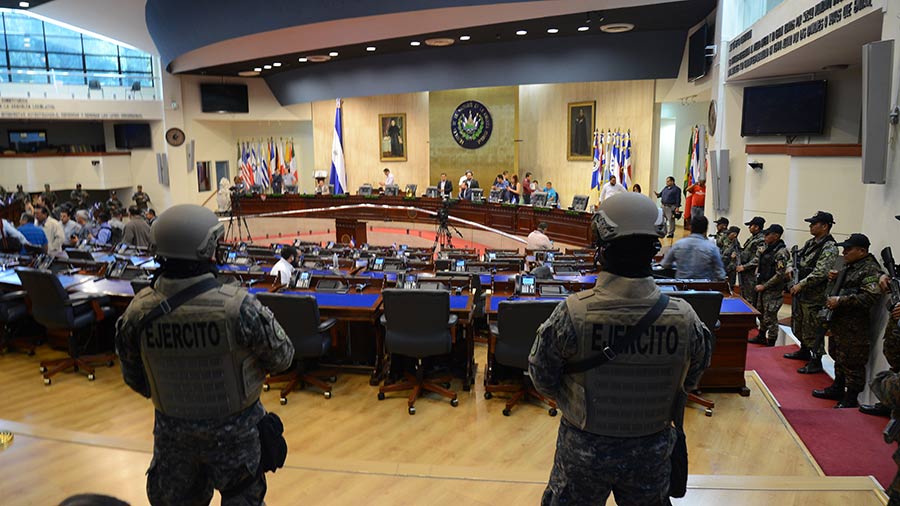
The recent economic stimulus package approved in the United States includes a clause that punishes the governments of the Northern Triangle for their corruption and little commitment to democracy.
In just over a year and a half, Nayib Bukele’s presidency has shown clear signs of a systematic attack on institutionality and the rule of law in El Salvador: it has disrespected court rulings, harassed opponents, closed doors to transparency. Worse, it has used the security forces as the weapon of its political whims.
This has not gone unnoticed in the United States, El Salvador’s main ally. On the eve of a change of government, and amid Bukele’s efforts to pay lobbyists to clean up his image in Washington, his North American ally will cut aid to the Salvadoran armed forces.
This cut is part of the comprehensive budget and stimulus package to combat the coronavirus that both houses of the US Congress recently approved and that President Trump ratified last Sunday, December 27.
It may interest you: The US Congress passes law to ban corrupt people from the Northern Triangle
Among the attachments to the main project was an anti-corruption clause in Central America, including a reduction in State Department resources for the purchase of US defense equipment for El Salvador, Guatemala and Honduras.
Bukele downplayed a legislator promoting the cut
During his incoming presidency, Bukele has shown signs of attacks on institutions that have not gone unnoticed in Washington DC. Although the Trump administration has remained silent in the face of some apparent abuses of power, with Bukele an ally in its immigration policy, both sides of the legislature have repeatedly spoken out against the Salvadoran president’s blows to rule of law.
One of the lawmakers who signed these rulings demanding respect for institutionality was Norma Torres, who is a member of the United States House of Representatives for the state of California. At the time, Bukele downplayed Torres and other lawmakers who spoke out against his abuse, said they were unrepresentative, and even reported that they had only signed by signing, without knowing what the letters contained.
The same lawmaker he downplayed was the one who promoted the partial cuts in the Armed Forces funds endorsed by the Senate and sanctioned by Trump.
Also read: Three keys to understanding Joe Biden’s plan for Central America
This legislative project also includes other types of sanctions against government officials who have damaged democracy in El Salvador, Honduras and Guatemala. Joe Biden’s government, taking office on Jan. 20, has just under 6 months to provide a list of those it considers corrupt in the Northern Triangle and the country will revoke visas and impose sanctions such as approved by both. legislative chambers.
This, combined with the Biden plan for Central America, which is having severe consequences for the corrupt countries, is a setback for the Northern Triangle countries that have become accustomed to the Trump administration’s transaction style: they worked faithfully with the immigration policy in exchange for receiving the award. Washington and a dismissive look at the obvious abuse of power.
Related note: Republican congressmen see Bukele moving away from democracy
Former United States Ambassador to El Salvador, Mari Carmen Aponte, told El Diario de Hoy a few months ago that President Bukele would do well to expect a different treatment from the Biden government, which he expected he would be stronger against abuse of power. .
Bad news for Bukele, good for El Salvador
José Miguel Vivanco, President for America at Human Rights Watch (HRW), spoke about this and responded to the news on Twitter that this “is good news for El Salvador. Bad news for Bukele. “
Vivanco, who has regularly criticized the president’s abuses and was even blocked by the president on Twitter, said that “his repeated abuse has international costs. And with Trump’s end, those costs will only go up. “
US cuts military aid to El Salvador
Good news for El Salvador.
Bad news for Bukele.
Its repeated misuse has international costs.
And with Trump’s end, those costs will only increase.
https://t.co/LZ96a40fjj
– José Miguel Vivanco (@JMVivancoHRW) December 29, 2020
The HRW official provided his tweet with an image of Feb. 9, the most iconic event of Bukele’s abolition of the rule of law, when he led a military and police takeover of the Legislative Assembly to push for a loan. This event may have been the turning point in the Salvadoran president’s international image and the end of the “honeymoon” many international observers had with Bukele.
This cut does not cover most of the cooperation to combat drug trafficking and other tasks, but it is a message to the countries of the Northern Triangle.
“This puts these countries on the same level as dictatorships and failed states,” said Adam Isacson, a member of the Washington Office for Latin America (WOLA), a think tank for the promotion of the rule of law in the region.
Napoleón Campos, an expert in international affairs and nominee for deputy for Nuestro Tiempo, confirmed that “Nayib Bukele did it again! He lost Fomilenio III to El Salvador and now US military aid (President) Trump is signing the law that qualifies Bukele as corrupt and which causes serious damage to democracy and the rule of law. “
For her part, Bukele’s designated ambassador to Washington, Milena Mayorga, expressed surprise at this cut and, in an interview with The Associated Press (AP), called for a reconsideration of the decision, in addition to emphasizing Bukele’s supposed democratic commitment.